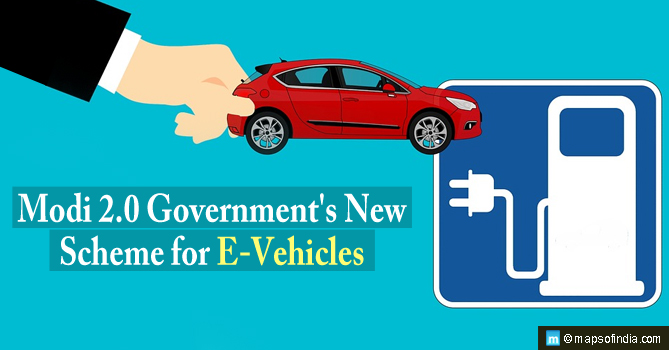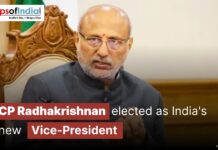
Modi 2.0 government seems to be intent upon going green by promoting electric vehicles in its Union Budget 2019-20. While presenting her maiden budget in the Parliament on July 5, 2019, Minister of Finance and Corporate Affairs, Nirmala Sitharaman, outlined multifarious proposals to make India a global hub for e-vehicle manufacturing, and at the same time incentivize their adoption.
Sitharaman said that under Phase-II of the FAME (Faster Adoption and Manufacturing of Hybrid & Electric Vehicles) Scheme, incentive will be provided to the advanced batteries as well as registered e-vehicles only. She underscored that greater emphasis will be provided on e-vehicles, so that common people can get affordable and environment-friendly public transport.
The new scheme also encourages faster adoption of e-vehicles by:
– Providing upfront incentive on the purchase of these vehicles
– Establishing the necessary charging infrastructure
FAME (Phase-II) Scheme has an outlay of Rs. 10,000 crore for a 3-year period, following the cabinet approval, and has already started from April 1, 2019.
The Finance Minister went on to say that e-vehicle manufacturing will get a major boost after the inclusion of solar storage batteries and charging infrastructure in the FAME (Phase-II) Scheme. She stressed on the fact that this will help India leapfrog and ultimately become a global hub in e-vehicle manufacturing.
Nirmala Sitharaman said that Modi government has already moved GST council for lowering the GST rate in e-vehicles from the existing 12% to 5%.
To boost consumer demand for electric vehicles (EVs), the Union Budget 2019-20 announced providing additional income tax deduction of Rs 1.5 lakh on the interest paid by the customer on auto loans for purchasing e-vehicles. Reports say that the taxpayers who take auto loans for purchasing EVs will get a total benefit of around Rs 2.5 lakhs over the loan period. For incentivizing e-mobility, Modi 2.0 government has also exempted customs duty on certain automobile parts of electric vehicles.
Minister of Finance and Corporate Affairs Minister Nirmala Sitharaman’s announcement of the incentive schemes for both the manufacturers and consumers of e-vehicles comes at a time when Niti Aayog has proposed a ban on all 2-wheelers and 3-wheelers having internal combustion engine under 150cc and migrate to full e-vehicles by 2023 and 2025 respectively.
Immediate Effects, Sentiments & Feedback
Effect on Market
After the announcement of the Finance Minister on new schemes for e-vehicles, the auto index fell by half a percent. The leading manufacturers of the petroleum-based automobiles, such as Hero MotoCorp, Mahindra & Mahindra, Bharat Forge, Ashok Leyland, Motherson Sumi Systems, and many others became the top losers.
Fossil Fuel Based Automobile Industry’s Feedback and Suggestions
A recent Niti Aayog note to the Finance Ministry called for a complete ban of fossil fuel based vehicles on Indian roads by 2030. Most of the automobile manufacturers are not happy about this, because they feel such a paradigm shift in such a short time-span will be too disruptive and will have tumultuous effects on the industry as a whole. They say currently the automobile companies don’t have the required capacity for taking up such investments.
The lobbying body of the auto industry, Society of Indian Automobile Manufacturers (SIAM), has proposed an incentive scheme for scrapping the old and polluting vehicles. They say this scheme will help take the old and polluting vehicles off the Indian roads, which in turn will help in boosting renewal sales.
Ola CEO’s Reaction
India’s largest mobility platform Ola’s Co-founder & CEO Bhavish Aggarwal called the Modi 2.0 government’s push for e-vehicles and electric mobility in the recent union budget inspiring and encouraging. He went on to say that this push for EVs reinforces the mission of Ola in building electric mobility in India, and will also help India become the global hub for innovation in e-vehicle manufacturing.
The Reaction of EV Companies and Lobbying Body
Sohinder Gill, Director General of Society of Manufacturers of Electric Vehicles, said that the announcements by the Finance Minister will make both consumers and manufacturers of e-vehicles cheer. He lauded the decision of extending e-vehicle manufacturing benefits under Section 35AD(1). Gill said, “It will help in the creation of a local manufacturing base and encourage component manufacturers to invest in the sector.” He emphasized that the government decision of bringing down the custom duty to nil will significantly reduce battery cost on the one hand, and help local battery manufacturers scale-up the business.
Tarun Mehta, Co-founder and CEO of Ather Energy, said that additional income tax reduction will provide enough incentive for the end-consumers to buy e-vehicles. Jeetender Sharma, founder and managing director of Okinawa Autotech, said that the EV-friendly decisions announced in the budget will not only incentivize EV purchase but also make these new-age vehicles more affordable for consumers.
Ayush Lohia, CEO of Lohia Auto Industries, said that the new schemes for the e-vehicle sector will attract more investment in EV manufacturing and at the same time also ensure clean energy over a certain period of time. He went on to emphasize that the decision of Modi 2.0 government will usher in the next generation in sustainable mobility and also provide the consumers with an attractive alternative.
Related Links:
Forthcoming Electric Vehicles in India





